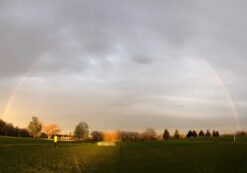Play Lesson
Ashton: Hi, I'm Ashton Gustafson, and welcome back to the final lesson of the Loveable Mini-Course with Dr. Kelly Flanagan. You guys know, we've been going through a few lessons about his book Loveable. And in this lesson, we want to put a bow on it. It's called "Circling the Mountain." So here's Dr. Kelly Flanagan.
Ashton: Alright, Kelly, to kind of put a bow on this, as we conclude the mini-course of Loveable, a phrase you kind of use is "circling the mountain." Talk to us exactly about what you're getting at when you mean circling the mountain here in the Loveable series.
Kelly: This is an image or a metaphor that was given to me by sort of a mentor of mine, a psychiatrist that I worked with and for many years. And I remember him saying one day that growing and transforming, it's like circling a mountain. You can't scale a mountain straight up the side of it. It's too dangerous. You'll never make it. A steep mountain has to be scaled by circling it in gradual concentric circles. And what that means is that you will come back at some point in your journey to view the exact same view as you did before, but just from a little higher up.
Kelly: And so it's not that you're leaving anything behind as you grow and sort of make your way up the mountain. You are always coming back to some of the same stuff and wrestling and having to deal with it again, but in a new way, with new tools, with new insights, with new growth and wisdom. And I love the idea that when you get to the top of a mountain, the thing that makes it a beautiful view is everything below it. And so our whole story of getting there is really what makes being at the top beautiful. There's nothing particularly special about the top - its the journey that brings you there and everything below. So this idea of circling the mountain for me begins to take the pressure off of even this Loveable journey of, okay, so I've got to figure out my worthiness and then my belonging and then my purpose, and then I'm going to arrive at the finish line.
Ashton: We're not talking about arriving here.
Kelly: Nope. We're not talking about arriving. That's right. So this idea of strictly in the mountain to me is really fundamental, because if you don't, if you don't incorporate that kind of imagery into it, then when you when you haven't arrived, you've just given yourself a new reason to feel ashamed, right? I thought I was supposed to arrive at the end of all this. And now there must be something fundamentally wrong with me that I haven't arrived. It's like, no, that's how it works, is you get to deal with this all over again, but it'll be different this time in a way. And you're going to learn new things and you're going to discover new parts of yourself. So anyways, I think it's essential to making sure that we don't just reintroduce another reason for shame.
Ashton: Well, and you and I have talked about this, about my love of the autumn season. Like, autumn comes every year. The trees are going to do their dance. Every fall, the grass will burst up with new flowers in the spring. This is the pattern of everything, right? That order disorder, reorder, death, burial, resurrection. These are not announcements of one moment in time. These are announcements about how things are. This is about how reality works. And so I think again we're talking to ego work here, where you're not going arrive. And maybe this is the phrase that has helped me: "You've got to drop the scorecard." There's no score.
Kelly: That's right.
Ashton: You can't put a checkbox by "lighter and brighter." You can't weigh these things. You can't weigh peace. You can't weigh joy. But those are what grow and become more and more abundant as you make your laps around the mountain.
Kelly: My spiritual director, just a couple of weeks ago, the phrase that he gave me that has helped with this, he said, "Kelly, be careful of wanting everything to be all buttoned up." You know, like, be careful of thinking, okay, I'll figure this out and then that'll all be taken care of. And in that graceful way of him saying it, I'm like, oh yeah, when I want things buttoned up, that means my ego is reasserting itself and saying, 'I want to be at the top of the mountain immediately. I want to have arrived.' And so I've been catching myself. And I'm noticing newly, oh, yeah, there's a lot of things I want to button up, and what if I didn't strive for that in this moment but just thought how can I grow? How can I keep moving up the mountain right now in this moment?
Ashton: So, what are some of the hallmarks of moving up the mountain? When we use that language, what have you found as, whether it's an inner state, whether it's a mental narrative, whether it's how your eyes see, how your feet and hands move in the world, talk to me about that.
Kelly: I think this is one of the more important junctures of growth and transformation. And it's just a reality of the way it works is that, as you get greater clarity about your passion, as you step into a life that embodies that more, it takes you into new territory usually. It introduces you to new people. And so it calls up all over again the questions of your worthiness. "Okay, so I embrace my passion for writing, and I wrote a book, and now I'm publishing it. And, oh, no, what am I doing?"
Ashton: People are going to read it.
Kelly: People are going to read this thing. Am I good enough to be read publicly, for instance? And one of the hallmarks of this circling the mountain is that every time that shame reasserts itself, you are no longer surprised by it. You're like, oh, this is a sign that I'm growing.
Ashton: I'm on my path. This is the right way.
Kelly: That's right. If I don't have this shame reasserting itself, it means I haven't gone into new territory within myself or in my life. And so it is both expected, and now I don't think of it as a bad thing. I think of it as another chance to listen for the voice of grace within me, telling me something new about my worthiness. And so there's that sort of lack of alarm when it happens, there's a knowledge that, okay, what I need to do is slow down again. I'm going to be tempted with this shame reasserting itself to prove my worthiness in X, Y and Z ways. Slow down again. Listen for the voice of grace. Trust that it's there. You hear people say that, as your faith in that voice within you grows, it takes less time to hear it again. It becomes a more familiar voice. It's more present to you. You're more connected to it than you've ever been. And so those periods of shame get shorter. They get less intense, even as they're happening you're less attached to them, you know that they're going to be moving on.
Kelly: And your circles belong and get clearer. You get more clarity about, like, oh, I'm still trying to force that relationship. That was my spiritual direction appointment today: it was like, still trying to force that one, which is a compliment, because you really love that person, like a ton, no wonder you're still trying to force it. But it's not flowing. And so your circles are belonging get clearer as you go up the mountain, your sense of ability to be authentic with and trust your people, and that safety grows. And if your sense of your passion and your clarity about that isn't evolving, you're probably not moving along. So, I hear people say, like, "What if I've got it wrong?" You do have it wrong. I guarantee you in two or three years, you'll have so much more clarity about how you're wanting to show up in the world and what you want to do while you're showing up that way. So the good news is you do have it wrong in the sense that you're always getting to know yourself better. So these are the things that we start to see on the way up the mountain.
Ashton: Right. Absolutely. And I think, I don't know who said it, but, you know, words create new worlds. And I think that we have to watch our language in these seasons of movement, the seasons from order, disorder, reorder the seasons of being in liminal space, of new places we haven't been before. Are you using language of isolation and loneliness? Are you using language of being connected, collected and together? That itself is going to help you as you journey up your own proverbial mountain, and I think it will help you. "Oh, I'm stepping backwards." Isolation alone, scarcity, shame. All of those things. Or abundance, hope, joy, peace, rest, being connected together in union. When those words become the candles we hold, transformation is right around the corner.
Kelly: So glad you said that, because one of the early signs that shame is sort of reasserting itself on your way up the mountain is when you start to have the thought, "What should I be doing?" Should is a sure sign, or "What am I supposed to be doing?" And the words to replace that with are, "What would I enjoy doing? What do I want to do? What do I feel drawn to?" And so just that simple word when you ask yourself the question instead of what should I be doing, what do I want to be doing right now?
Ashton: Absolutely man. Well, I know I've said it many times to you in person and over the inter webs, how we connect. But I'm beyond grateful for your kindness and generosity, the wisdom you've given us, the wisdom you've given the world. And I'm confident these blessings are going to help people move into lighter and brighter days. And so thank you. You guys make sure that you go and follow Kelly and his work. Get you a copy of Loveable if you don't have it. Kelly, how would you invite people to find out more information about you and what you're doing in the world?
Kelly: Yeah. So you know, this community that started loosely as a therapist who was blogging ten-some years ago and wanting to tell people about what it's like to heal and grow, is increasingly sort of coalescing around just a wonderful group of people in the world who are interested in being lighter and brighter. I'm calling it the Loveable Learning Community, and we got all sorts of ways we're engaged in learning right now, and so my biggest encouragement would just be to stay tuned. I'm going to be sending out emails, not terribly frequently, and they're not terribly long, but just updating you about what's going on. A new blog post. A Zoom gathering. We're going to resume our Human Hours here in the coming months, and we're going to get together in person as much as we can actually, at several events over the years. People can grab a copy of Loveable, a copy of True Companions, and just mostly stay connected to that email list because you're going to hear about everything that's coming up.
Ashton: Right on. Well, that wraps up our Loveable Mini-Course. I'm Ashton Gustafson. It's been a joy to be with you here and walk through this beautiful wisdom with Dr. Kelly Flanagan. If this information has brought love and light and transformation into your life, we hope that you would go share it with those you love and those you lead. That's the best thing you can do with this type of information, when it has brought change into your life, that you go share it with the people that are closest to you. God speed.





